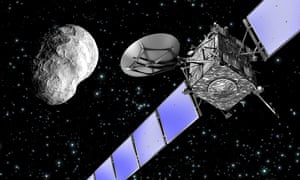| Online: | |
| Visits: | |
| Stories: |
Rosetta mission: Philae comet probe could unlock secrets of the universe
Rosetta mission: Philae comet probe could unlock secrets of the universe
Craft named after Egyptian obelisk will land on comet and collect samples that could give clues to origins of the galaxy
Artist’s impression of the Rosetta spacecraft flying past an asteroid
Next month, if all goes to plan, a 10-year journey through space will culminate in a landing craft called Philae touching down on a comet as part of the Rosetta mission and, possibly, unlocking secrets of the universe.
Space agency scientists rubbed shoulders with Egyptologists on the lawn of an English country estate on Wednesday to look forward to the historic day and to highlight the link between this trip to the stars and a brilliant 19th-century British adventurer.
Packed with probes and cameras, Philae is due to land on the comet at teatime on 12 November. It will map the comet and drill into the surface to grab samples that could give clues about the origins of the galaxy and Earth.
What may be missed in the excitement is a fascinating backstory to the name of the craft – hence the visit by some of Europe’s eminent space scientists to the Kingston Lacy estate in Dorset and a pilgrimage to the Philae obelisk, which has sat for almost 200 years in the grounds.
Kingston Lacy was the home of William John Bankes, who undertook his own extraordinary journeys at the beginning of the 19th century to study the ancient world. During one trip to Egypt, he saw an obelisk lying on its side at the crumbling Temple of Isis on the Isle of Philae in the Nile.
He employed a former musical hall giant to transport the obelisk to Kingston Lacy. Bankes, however, was not content simply to admire the pink granite monument, which was inscribed with Greek and hieroglyphs, but set about studying the inscriptions.
He spotted the name Cleopatra in Greek and worked out which hieroglyph also probably represented the ancient queen’s name. The findings of Bankes, and others who seized upon his work, led to the
cracking of the “code” to hieroglyphs and allowed inscriptions on the Philae obelisk, the Rosetta stone and many other ancient Egyptian artefacts to be understood.
When those behind the European Space Agency mission were casting around for a name for the project they were drawn to the Rosetta stone, which is to be found in the British Museum in London, and to the more obscure Philae obelisk.
Ian Wright, professor of planetary sciences at the Open University and one of those involved in planning the landing, said he had not heard of the obelisk before the team came up with the name. “It’s fascinating to come and learn about it,” he said.
Yet another group of scientists at Kingston Lacy are members of Oxford University’sCentre for the Study of Ancient Documents. They are using earthbound cutting-edge imaging techniques to pick out the Greek inscriptions on the stone that have eroded over the decades. Their analysis is in its early stages but experts have discovered that the text contains messages significantly different to the hieroglyphs, showing that different audiences were addressed in different ways.
James Grasby, a curator for the modern custodian of Kingston Lacy, the National Trust, described the proceedings as a “wonderful collision” between different fields. “The Philae obelisk led to a greater understanding of the ancient world. The Philae probe may lead to greater understanding of the planets and life on earth,” he said.
Grasby said Bankes would have been “bubbling over with joy” at the idea of so many scientists gathering on his lawn. “He lived in the world of ‘why and why not’. Not in the adult world of ‘because’. He spent his whole life inquiring about things and seeking out experts who could add to his knowledge. He would have been in his element.”
Source: http://www.theguardian.com/science/2014/oct/23/rosetta-mission-philae-comet-universe
http://www.pureinsight.org/node/1475
http://www.pureinsight.org/node/1116
http://www.pureinsight.org/node/167







I have already “unlocked the secrets of the universe” in “The Beauty of Existence Decoded” but there has not been a stampede for hallowed information. It is available on Book Country/Amazon-Kindle in case anyone cares:
https://ozziethinker.wordpress.com/about/
Science can spin its yarns built on Egyptian myths captured by a satellite of war. The collective can drink the blood soul and feast off the energetic flesh of the people as ascension passes by unnoticed. Everyone will be as ignorant as ever perpetually affirming the “need for survival”.
Best
OT
http://ozziethinker.wordpress.com
Political conscience forum
http://exopolitician.wordpress.com
Exo-political resource